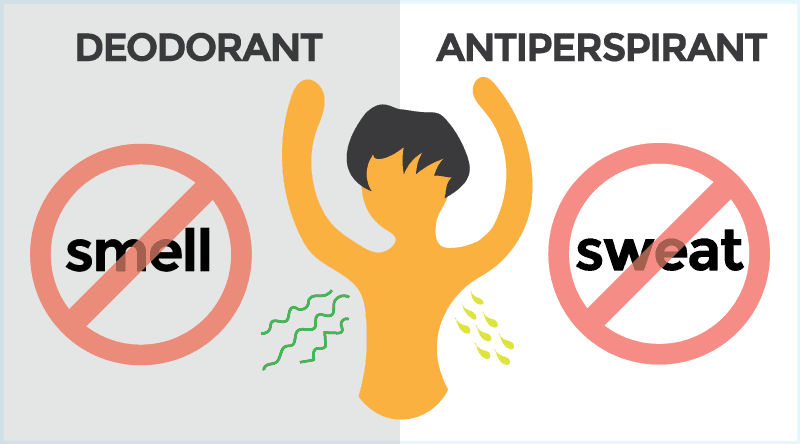Antiperspirant vs. Deodorant: Understanding the Difference
In the quest for personal freshness and hygiene, choosing the right product is crucial. Antiperspirants and deodorants are two common choices, but do you know the difference between them? In this comprehensive guide, we’ll break down the distinctions between antiperspirants and deodorants, helping you make an informed choice for staying fresh and dry.
What is an Antiperspirant?

antiperspirant vs deodorant
Antiperspirants are a popular choice for those seeking to combat excessive sweating. They work by reducing sweat production in the sweat glands, helping you stay dry throughout the day. The key players in antiperspirants are the active ingredients that block sweat ducts. Common ingredients include aluminum-based compounds like aluminum chloride or aluminum zirconium.
Antiperspirants are available in various forms, including roll-ons, sprays, and solid sticks. They are typically applied to clean, dry skin, usually at bedtime to allow the product to work effectively overnight.
What is a Deodorant?
Deodorants, on the other hand, focus on addressing body odor rather than sweat production. They work by neutralizing or masking the odor caused by bacteria that thrive in sweaty areas. Deodorants often contain antimicrobial agents, fragrances, and other ingredients to combat odor.
Deodorants come in various forms, such as roll-ons, sprays, sticks, and even creams. They are applied to clean, dry skin, usually after showering or as needed throughout the day to maintain freshness.
Key Differences Between Antiperspirants and Deodorants
When it comes to choosing between antiperspirants and deodorants, understanding their unique functions is essential. Here are the primary distinctions:
Sweat Control:
Antiperspirant:
Effectively reduces sweat production, keeping you dry even during strenuous activities.
Deodorant:
Masks or neutralizes odor but does not control sweat.
Active Ingredients:
Antiperspirant:
Contains aluminum-based compounds that block sweat ducts.
Deodorant:
Contains antimicrobial agents, fragrance, and odor-neutralizing substances.
Duration of Effectiveness:
Antiperspirant:
Provides long-lasting protection against sweat, often lasting 24-48 hours.
Deodorant:
Needs to be reapplied throughout the day for continuous odor control.
Suitable for Different Needs:
Antiperspirant:
Ideal for individuals with hyperhidrosis (excessive sweating) or those who want maximum sweat protection.
Deodorant:
Suited for individuals with milder sweat issues who primarily want to address body odor.
Combination Products:
Some products on the market combine both antiperspirant and deodorant properties for comprehensive sweat and odor control.
Understanding these distinctions allows you to choose the product that aligns with your specific needs and preferences.
Pros and Cons of Antiperspirants
Pros:
Effective at reducing sweat production.
Provides long-lasting protection.
Suitable for individuals with hyperhidrosis.
Available in various application forms.
Cons:
May cause skin irritation for individuals with sensitive skin.
Some individuals prefer a more natural approach to sweat control.
Pros and Cons of Deodorants
Pros:
Effectively masks or neutralizes body odor.
Generally well-tolerated by individuals with sensitive skin.
Available in a wide range of scents and formulations.
Can be reapplied throughout the day as needed.
Cons:
Does not control sweat production.
May need frequent reapplication for continuous odor control.
Choosing the Right Product for You
Now that you have a clear understanding of antiperspirants and deodorants, how do you decide which one is the right fit for your daily routine? Here are some factors to consider:
Sweat Concerns:
If you struggle with excessive sweating and want to stay dry even in challenging situations, an antiperspirant is likely the better choice.
Skin Sensitivity:
If you have sensitive skin or have experienced irritation with antiperspirants, a deodorant with milder ingredients might be a safer option.
Odor Control Priority:
If your main concern is odor control, a deodorant can effectively mask or neutralize body odor throughout the day.
Occasion and Activity:
Consider the specific occasions and activities in which you’ll be using the product. For a long day at the office, an antiperspirant might be ideal, while a deodorant could suffice for a casual outing.
Combination Products:
Some individuals prefer the convenience of combination products that offer both sweat control and odor protection.
Natural Alternatives and Health Considerations
If you’re concerned about the ingredients in traditional antiperspirants and deodorants, you may explore natural alternatives. Many natural products on the market offer odor control using ingredients like baking soda, arrowroot powder, and essential oils. These products are often free from aluminum and parabens, which some individuals prefer to avoid.
FAQs and answers related to “Antiperspirant vs. Deodorant”:
Q1: What is the main difference between antiperspirant and deodorant?
A1: Antiperspirants control sweat by reducing its production, while deodorants mask or neutralize body odor.
Q2: Can I use both antiperspirant and deodorant at the same time?
A2: Yes, many products are designed to combine both antiperspirant and deodorant properties for comprehensive sweat and odor control.
Q3: Are there any health concerns associated with antiperspirants?
A3: Some individuals may experience skin irritation or have concerns about the aluminum compounds in antiperspirants. Consult a healthcare professional if you have specific health concerns.
Q4: Do natural deodorants work as effectively as traditional ones?
A4: Natural deodorants can effectively control odor but may not provide the same level of sweat control as antiperspirants.
Q5: What factors should I consider when choosing between antiperspirant and deodorant?
A5: Consider your sweat concerns, skin sensitivity, odor control priorities, occasion, and activity level when making your choice.
Q6: Is it okay to switch between antiperspirant and deodorant depending on the day?
A6: Yes, you can use antiperspirant for days when sweat control is crucial and deodorant for lighter activity days.
Q7: Are there any long-term effects of using antiperspirants or deodorants?
A7: There is no conclusive evidence of long-term harm from using these products. However, individual reactions may vary.
Q8: Are there natural alternatives to traditional antiperspirants and deodorants?
A8: Yes, natural alternatives often use ingredients like baking soda, arrowroot powder, and essential oils for odor control.
Q9: Can I make my own antiperspirant or deodorant at home?
A9: Yes, many DIY recipes for homemade antiperspirant and deodorant are available online, using natural ingredients.
Q10: How do I know if I need a clinical-strength antiperspirant?
A10: If regular antiperspirants don’t provide sufficient sweat control, consult a healthcare professional for recommendations on clinical-strength options.
Conclusion
In the age-old debate of antiperspirant vs. deodorant, there’s no one-size-fits-all answer. Your choice ultimately depends on your unique needs and comfort level. Whether you opt for the sweat-controlling prowess of an antiperspirant or the refreshing scent of a deodorant, the goal remains the same: staying fresh and confident throughout your day.




